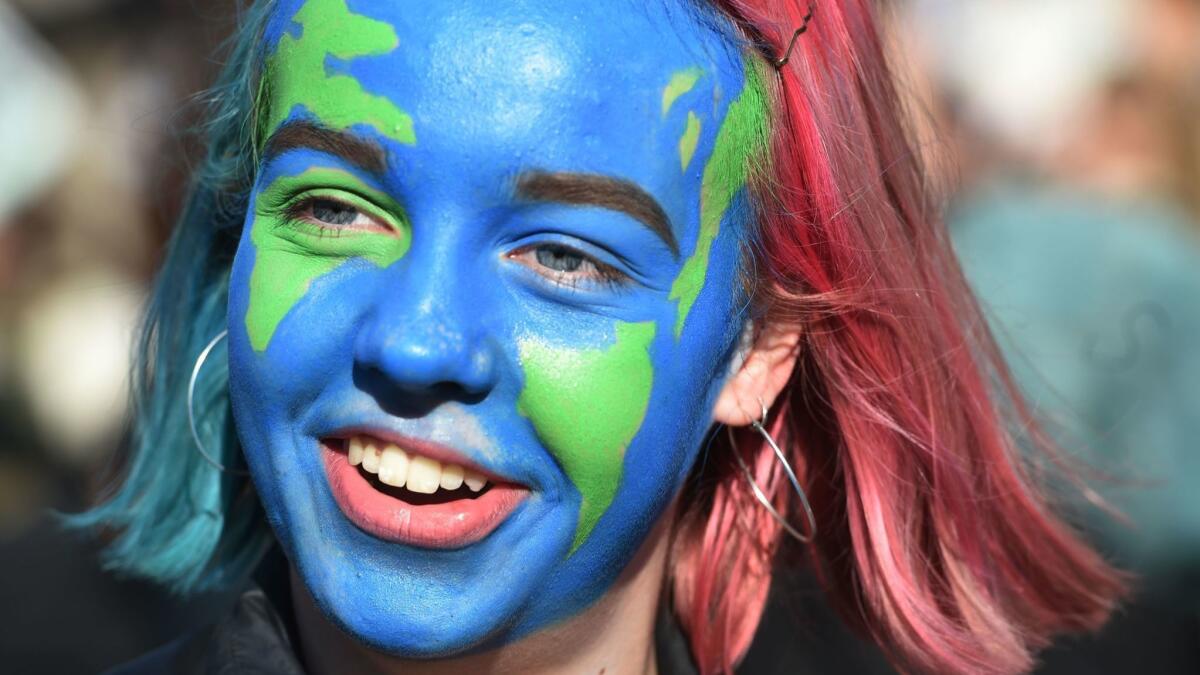Op-Ed: Students are striking for action on climate change — a truancy everyone should applaud

- Share via
Consider this a note explaining why one of us will be absent from school on March 15 — and why everyone else should applaud this truancy.
Beginning last August, a Swedish schoolgirl named Greta Thunberg went on strike from her classes, choosing instead to spend the days on the steps of the Parliament building in Stockholm. Her reasoning: If her government couldn’t be bothered to safeguard her future by taking action against climate change, it was a bit rich to demand that she spend her time preparing for a future that might not exist. Her protest soon spread across Scandinavia, Europe, Britain and Australia.
Hundreds of thousands of schoolchildren have now participated worldwide, and the protest has drawn some prominent support: German Chancellor Angela Merkel said on March 2, “I very much welcome that young people, school students, demonstrate and tell us to do something fast about climate change.” But of course others have been less understanding. During climate demonstrations in Australia, the Prime Minister Scott Morrison said, “We do not support our schools being turned into parliaments. … What we want is more learning in schools and less activism in schools.”
Lacking access to piles of cash, young people do what they can. And a strike is one such measure.
On Friday, many thousands of American students will be joining the school strike, so we’d like to lay out the reasoning behind it in more detail, in the hopes that people will view these protests with the seriousness they deserve.
It was 30 years ago that scientists first explained that burning fossil fuels was changing the composition of the atmosphere and driving the rapid warming of the Earth. That is enough time to educate a student all the way from preschool to a PhD, but it hasn’t been time enough for our politicians to learn how serious a climate catastrophe we are facing. The American government, in particular, is a study in inaction. Our federal government has reversed course on every effort to change laws and regulations. Our current president has taken steps to drop out of the 2015 Paris climate agreement, the only international effort to combat global warming. Young people see that their future is on the line, which is why they’ve been at the front fighting against oil companies, pipelines and fracking wells.
You don’t need to be much past first grade to know that when you’re in a hole you should stop digging. Or, in this case, drilling. It is time to replace fossil fuel energy with power from the sun and wind — and we have the cheap solar panels and turbines to do it. But America has become the largest producer of gas and oil in the world, and most politicians lack the courage to stand up to the industry. Both of us, for instance, worked last fall on a modest Colorado referendum that would have prohibited oil wells right next to homes and schools, only to watch fossil fuel companies outspend local activists 40 to 1 and narrowly defeat the measure.
So, lacking access to piles of cash, young people do what they can. And a strike is one such measure.
It’s not a stunt. A stunt is Australia’s now-prime minister bringing a lump of coal to parliament to pass around to his colleagues. A stunt is former Colorado governor John Hickenlooper literally drinking a cup of fracking fluid.
Enter the Fray: First takes on the news of the minute from L.A. Times Opinion »
A school strike, instead, recalls some of the most pivotal moments in American history. In 1963, for instance, the Rev. Martin Luther King found that he had run out of adult volunteers to stand up to Bull Connor at the height of the civil rights battle in Birmingham. So, after much soul-searching, King asked the city’s schoolchildren to leave class and face the police dogs and firehoses. “Don’t worry about your children,” he told their frantic parents. “They’re gonna be all right. Don’t hold them back if they want to go to jail. For they are doing a job not only for themselves but for all of America and for all mankind.”
No one striking for the climate on March 15 will confront the immediate perils those brave schoolchildren had to endure. But just as they anticipated a future blighted by segregation, so today’s young people face a future blighted by environmental destruction. And so they must act.
It would be better, of course, if adults had taken the lead. Stopping climate change is their responsibility. But they haven’t. Though pretty much every politician has made it out of college, their education seems to have done them little good. Maybe, at least for a day, there’s more education to be found out in the street. Instead of studying history, it’s time to make it.
Haven Coleman, a student in Denver, has been striking for the climate weekly since January. She is founder and co-director of US Youth Climate Strike. Bill McKibben wrote the first book on climate change in 1989, and helped found the global climate campaign 350.org.
Follow the Opinion section on Twitter @latimesopinion and Facebook
More to Read
A cure for the common opinion
Get thought-provoking perspectives with our weekly newsletter.
You may occasionally receive promotional content from the Los Angeles Times.









